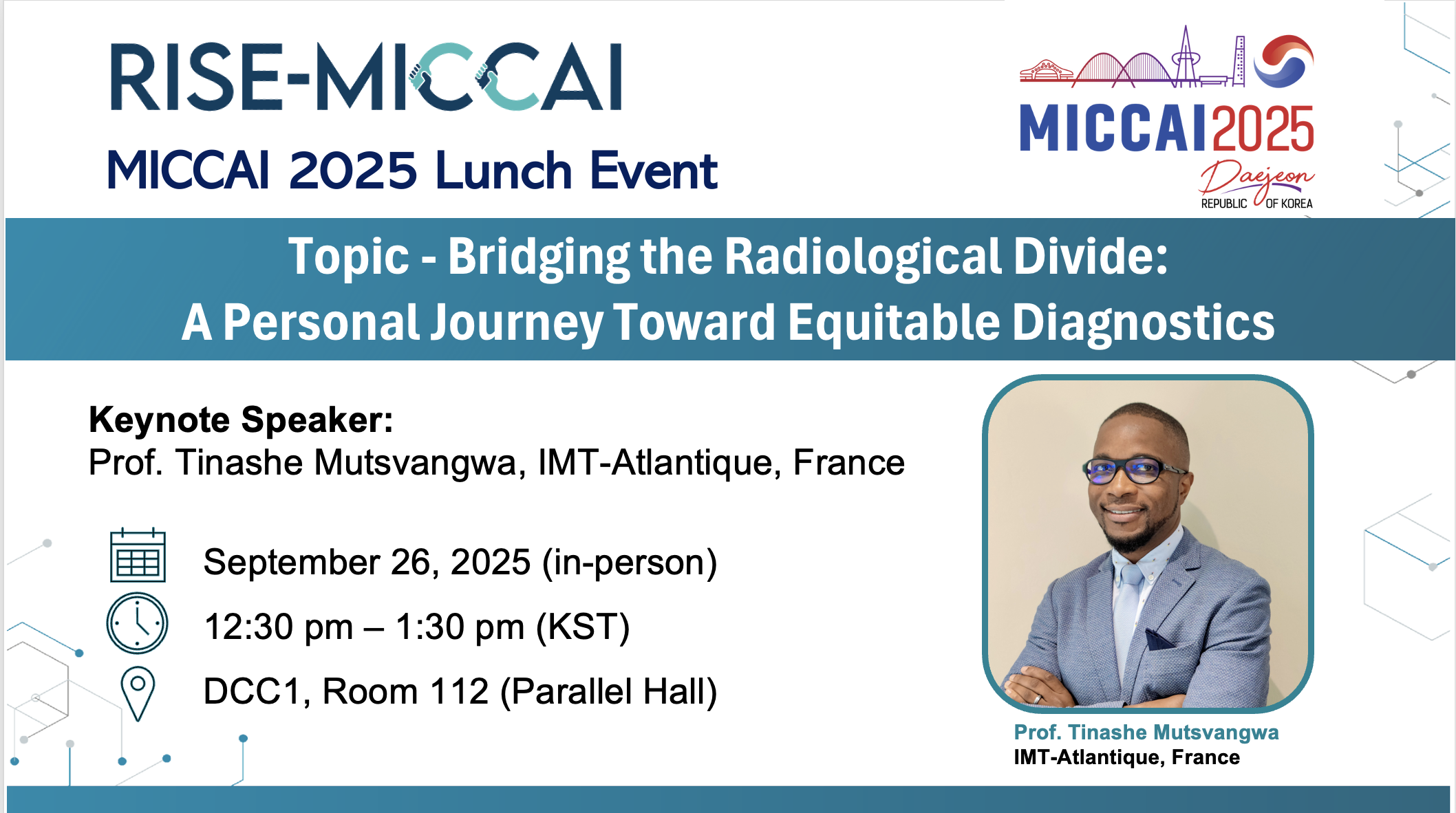Reinforcing Inclusiveness & diverSity and Empowering MICCAI in Low-to-Middle Income Countries (RISE) is an organisation within MICCAI dedicated to geographical fairness in medical imaging research. This year, they will be organising a lunch-time special event on "Bridging the Radiological Divide: A Personal Journey Toward Equitable Diagnostics," featuring Tinashe Mutsvangwa, the Head of the Data Science Program at IMT Atlantique.

![]()
To prepare for this event, we interviewed Esther Puyol Anton. Along with being the President of RISE, Esther is Senior Research Scientist at HeartFlow, Research Associate in the Biomedical Engineering Department at King's College London, one of the co-founders of the Fairness in Artificial Intelligence in Medical Imaging (FAIMI) workshop and MICCAI Special Interest Group, and undoubtedly an up-and-coming leader of the MICCAI community. Fairness, in many senses of the word, thus lies at the heart of her research.
What first got you interested in participating in RISE? And pursuing a leadership role?/
I've been involved in volunteering for many years, and when I first learned about RISE and its mission, I was deeply moved by its goal. I've always felt privileged to have had access to some incredible resources in my career, and I immediately knew I wanted to help ensure other researchers from Low- and Middle-Income Countries (LMICs) had the same opportunities. When Islem decided to step down as president, I spoke with her about my ideas for the future of RISE, and she strongly encouraged me to take on the leadership role. I've been enjoying it immensely ever since.
What do you think the MICCAI Society's priorities should be to improve equity in medical imaging research?/
In my view, the MICCAI Society's top priority should be to engage with more organizations and institutions to secure the necessary funding to increase attendance from LMICs. While we've seen a significant increase in LMIC attendees over the last two years, this growth has also highlighted persistent challenges beyond funding, such as a lack of access to GPU resources or data. We should also work to streamline the visa process to make it more accessible, following the example of other major conferences such as CVPR and NeurIPS that have been actively working to improve visa access and support more attendees.
I would like to dig down on this a bit more. When it comes to having large databases of open data, we often look to the challenges as MICCAI's standard-bearer. But they can be very competitive and a lack of access to compute might prevent researchers in LMICs from participating…
Indeed, it would be an incredible step forward if challenge organizers aimed to provide resources to LMIC students, creating a more level playing field for competition. Similarly, I think it's crucial that challenges consider the overall demographics of their data, as most current challenge data comes from affluent countries.
Challenges have a massive opportunity to address these issues. They could:
One more follow-up: what about regular MICCAI attendees and students? What can they do to make MICCAI better for researchers in LMICs?
For the wider MICCAI community, our priority is to foster a more inclusive and welcoming environment. Initiatives like our Summer School, which is open to everyone, our Journal Club, and our online tutorials and hands-on sessions are all designed to engage and connect students and researchers from all backgrounds. We're actively working to create a repository of high-quality educational content that benefits the entire MICCAI ecosystem.
We also believe it's vital for all MICCAI attendees and students to contribute to this goal. By fostering collaborations and mentoring students from LMICs, the community can directly help us bridge the gap and make a lasting impact on equity in medical imaging research.
Just one last question: what is on the horizon for RISE this upcoming year?
This past summer, RISE organized a very successful Summer School specifically for first-time MICCAI attendees, with a strong focus on those from LMICs who want to attend MICCAI 2026. We had an amazing turnout with over 300 online attendees and around 100 participants joining through our local hubs.
As part of this Summer School, we offered a one-year mentorship program, where one of the acceptance criteria was to participate in the LISA challenge. Over the next year, our main focus will be to support this mentorship program, maximize the paper acceptance rate for our mentees, and ensure we have enough funding to cover travel awards for those who get their papers accepted for MICCAI 2026.
Additionally, we have launched a new initiative, "Voices of RISE MICCAI.” The purpose of this initiative is to capture and share the journeys of MICCAI researchers, with a special emphasis on voices from LMICs. We aim to inspire and encourage junior researchers and students through authentic, personal stories. We have already interviewed Dr. Islem Rekik and Dr. Andrea Lara, and our goal is to expand to more people.